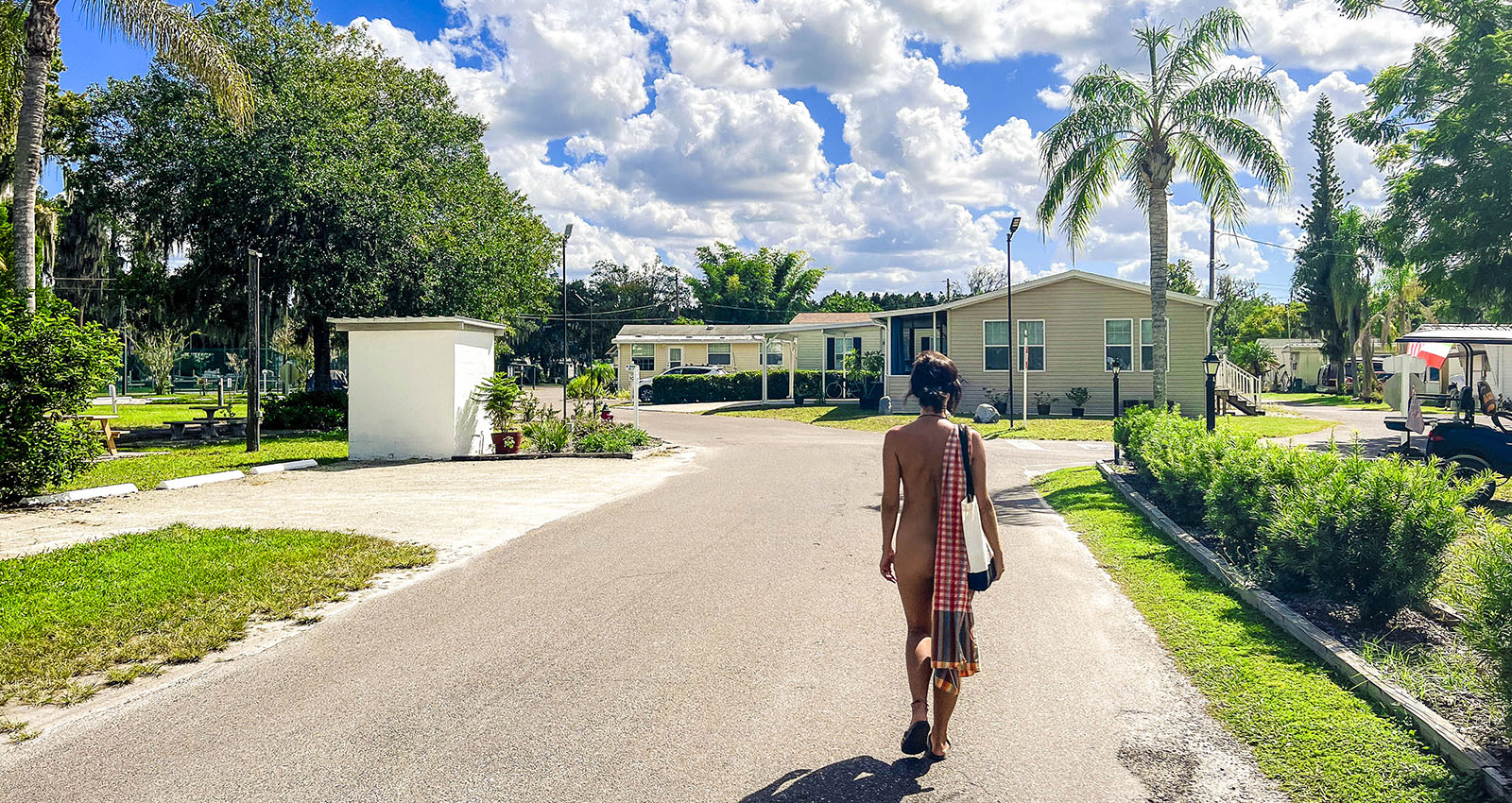The other day, an ignorant friend asked if we found any nudist colonies in Ibiza. He didn’t mean any harm, but literally every hair in both our necks went straight up. If there is one term we have detested ever since we’ve taken our first steps into social nudity, it was “nudist colony”. We know the word “colony” mostly from history class and immediately link it to imperialism, oppression and slavery. Pretty much the opposite of what social nudity is about.
A close second is “nudist camp”. One could say that the word “camp” is just short for campground, but to us, it sounds like either a place where you send your kids to in summer or one where outlaws and misfits are (often unwillingly) gathered together. In other words, a place where you put people so they are protected from the outside world, or where the outside world is protected from them.
This blog post has been sponsored by France4Naturisme, a group of 7 naturist resorts in France that are pretty much the opposite of what first comes to mind when you think of nudist camps or colonies.
View this post on Instagram
Different times
Of course, these are not new terms. They’ve been assigned somewhere in the course of history and managed to stick around for longer than they probably should have. We wouldn’t be surprised if the early naturists even invented or embraced them. Back in the day, being hidden from society was an important element of naturism and nudism because there could be many legal and social consequences. Even today, in countries like India and Malaysia, the naturist movements prefer to work under the radar as much as possible.
But not in the Western world. Although there are still taboos and stigmas, naturism is legal in the large majority of European and American countries. When you go to a private naked resort or gathering or to an official nude beach, there’s no need to fear that the authorities will crack down on you and put you in the stocks.
View this post on Instagram
From philosophy to recreation
We imagine that the early naturist camps were not places where you could just show up to spend an afternoon naked in the sun. It must have taken a lot of effort to figure out where they were located and you needed the right connections to be allowed in and to become a member of the community. Because that’s what they were, strong communities with strict rules where you couldn’t just walk in and out as you wished. You either agreed with the philosophy and started living a naturist life or you didn’t get to enter in the first place.
Today, at most naturist resorts, showing up is the only thing you need to do. You can find all the information online, on their websites or on websites like ours. You won’t be questioned about your philosophy. You’ll often won’t be asked of a membership card. Naturist resorts have become almost identical to clothed resorts, Only that the visitors will be naked. They have become places of nude recreation.
From health… back to health
Naturism started as a health movement, centered around the idea that a healthy body needs to absorb sunlight and that the more skin you expose to the sun, the healthier you’ll be. Keep in mind that although skin cancer was already discovered back then, it probably wasn’t very well known. Next to absorbing sun light, also eating healthy and practising sports was very important in naturist communities. This is why several present-day clubs still have the words “sun” or “sport” in their names.
As social nudity started shifting from philosophy to recreation, many took their first steps for a variety of different reasons. Some enjoyed the feeling of freedom of being nude. Others liked the practical side of not having to wear clothes. Or the equality when everybody is naked. Or the lack of tan lines. Although many nude resorts of today still have sports facilities, you’ll find that only a fraction of the guests are using them. To some, the health element was still the most important reason, but generally speaking, we doubt that it made the top five.
Interestingly, in the recent decade or so, practising social nudity for health reasons has seen a revival. Terms like “mindfulness”, “unwinding”, and “recharging” have become buzzwords in our modern, stressful society and there seemed to be a perfect match with social nudity. Many modern naturist resorts, like the ones of France4Naturisme, provide lots of facilities to improve your mental health, ranging from spa centres to massages to yoga and meditation.
What with the community?
One of the pillars of naturism has always been the community element. Throughout our travels, we’ve noticed that this still seems to be much more important in places where social nudity is rather new and much more of a taboo and that it became less important where social nudity is more generally accepted. This doesn’t come as a surprise. The more your life choices are considered weird or different, the more you’ll feel a need for finding peers. When it’s more socially accepted, this need for approval becomes less.
A true sense of community is hard to maintain at resorts that receive thousands of guests per day. They are like cities, where it’s not uncommon to not know who your neighbours are. In a way, social nudity became less social towards strangers and more about the people you are visiting with.
At many places of today, it may be better to talk about shared nudity. This is a cornerstone element that still creates a community even though you may not realise it that much. Just by being there, naked, you send out the message that you’re sharing a common ground with the others. No matter if you came to sunbathe, do sports, or set your mind at ease. We’re all still parts of the same tribe. Maybe we’re still a colony after all… Just don’t ever call it that again.

Support Naked Wanderings
Do you like what we do for naturism and naturists?
Did we make you laugh or cry?
Did we help you find the information you were looking for?
Then definitely join our Patreon community!






You are correct. of course, to point out the term “nudist colony” has become obsolete, but I have always felt its original use by naturist pioneers did not reflect a need to hide away from view, but rather the ambition to establish a “colony” (before that term came to be widely rejected for the reasons you mention) in the sense of a new kind of community and way of living — and a model for others to follow. As your excellent history says, they were motivated by philosophy rather than a desire for mere recreation.
So “nudist colony” is outdated not just because of the overtones of colonialism, but because social nudism today has become almost exclusively a recreational pastime. With the exception of a few places catering to retirees, there are virtually no communities left that still promote the idea of carrying on everyday life without the need for clothing (except for protection), and that is a loss.
It would be great if the movement to normalise social nudity in everyday life were revived, and even better yet if there were no need to rely on “colonies” or whatever inoffensive synonym you choose for an isolated or segregated community.
Thanks for sharing your insights!
And you’re totally right, communities where naturism is the central element are becoming fewer and fewer. Partly because they feel a need to compete with recreational resorts.
Nevertheless, we are seeing an uprise in self sustainable communities, where (partional) nudity is often common or at least not seen as an issue. But here, the nudity isn’t central nor do they call themselves naturist or nudist.
Sadly there is still a need for “camps” – designated areas like resorts or isolated beaches, to protect us from unbalanced people trying to abuse “public decency” laws.
Even in democratic and liberal Western Europe you’re still risking a fine and sometimes quite a fine (France) if you’re relaxing in the wrong place and someone “feels offended”.
We believe that camps also still exist because people actually want that. They also exist in countries like Spain, where public nudity is legal and quite common. Some people just prefer to be naked only among others who like to be naked. And that’s totally fine.
We agree with the comment about the links to health again, particularly mental health. We recently visited Praia Naturista do Malhão in Portugal and we loved the description of naturism in the law establishing it as an official beach that was quoted on the noticeboard by the car park – we felt it sums it up perfectly:-
“For the purposes of this law, naturism is understood to mean the set of practices of outdoor life in which nudism is used as a way of developing citizens’ physical and mental health through their full integration into the natural surroundings.”
We don’t recall seeing that sign, but it’s indeed a great description.
Yes, nudist “colony” is sooo cringe worthy of a term ….. Whenever I hear it – and I have a son-in-law who loves to tease me by calling the naturist resorts I attend just that – I envision a bunch of ants scurrying about their business, lol ….